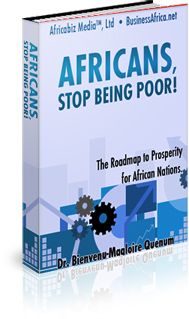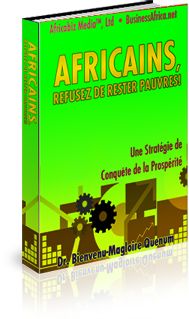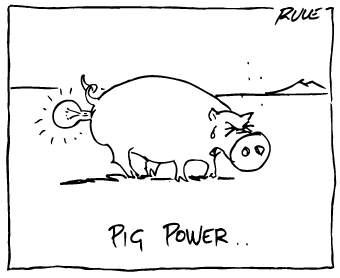|
****JavaScript based drop down DHTML menu generated by NavStudio. (OpenCube Inc. - http://www.opencube.com)****



|
| ! |
| AFRICABIZ
VOL 1 - ISSUE: 92
DECEMBER
15, 2006 - JANUARY 14, 2007
Previous
Issue
Editor: Dr. Bienvenu-Magloire Quenum
Click here for contact & support console
| | A
WORD FROM THE EDITOR
| | |
|
Dear visitor and international investor,
We
warmly welcome you, if this is
your first visit to Africabiz
Online - The ultimate newsletter
on trading and investing in 49
sub-Saharan African countries.
If you are a regular and faithful
reader, welcome back.
- HAPPY AND SUCCESSFUL BUSINESS YEAR 2007
Africabiz Online editorial team wishes you and your loved ones a very festive Christmas 2005-period; a happy and prosperous business year 2007.
- SELF SUFFICIENCY IN ENERGY IN AFRICAN COUNTRIES? FEASIBLE
Most of African cities around the continent are experiencing power cut (energy crisis.) Only about 50 up to 80 percent of national demand is satisfied by power generating stations, which cannot provide uninterrupted service. Electricity power is not delivered 24 hours around the clock but during only one to eight hours per day; and cities' boroughs are serviced one-by-one in a round- turn. Even countries that have mineral resources (coal and oil) or installed hydropower dams are in the same boat. That is for the cities.
In rural areas, the situation is dire. Indeed, some villages (one out of one thousand) have diesel powered electricity generators; but sometimes, these generators remain idle for months because there is no money to purchase oil-fuel. Therefore, the global coverage for electricity' supply at national level average 8 percent (an optimistic estimate! [1, 2, 3]) for the whole continent. That's the sad fact.
That state of affairs is really a paradox when the solution is simple and affordable for African countries that do not have deep pocket.
It is a paradox and a sad fact as we all know that without energy' supply, there would be no industrialization, and consequently, no harmonious developing that creates wealth for all. Let us here quote an expert, Mr. Itai Madamombe:
"On the outskirts of Accra, Ghana, business plans are only as final as the next electricity outage permits. In
July (2004), food tins at the Prime Pak canning factory were positioned on
the assembly line, ready to be sealed before export. Without warning, the machines
came to a screeching halt, leaving entrepreneur Cyril Francis standing helplessly
in the dark. Thirty per cent of the consignment spoiled."
In Strategy For African Countries, one component of
the proposed Integrated Scheme (that has the inherent capacity to generating annual double-digit growth-rates over a minimum of 10 years and accelerate the developing), is the production of vegetable oils and biogas (renewable energy).
Vegetable oil could be used as it is as pure vegetable-oil fuel to power motors and engines and generate electricity. The technology already exists and is reliable. The same for biogas production that uses vegetable waste, animal dung and human waste. Stoves, cookers, electric bulbs, industrial machine and equipment designed to use biogas (and electricity produced by biogas) are now industrially produced - and are efficient and reliable.
In Business Opportunities' section, a
brief about "how much electricity an animal breeding operation could generate through the production of biogas" is
exposed.
The result is an outstanding daily 1.2 megawatts per hour (MWh) of
electricity generated through the breeding and fattening of a flock of 3,206
pigs per year.
That is a tremendous achievement that shows it is possible for African countries to sustain self-sufficiency in energy through animal breeding - not to speak of the production of vegetable oils to be used directly as vegetable-oil fuel. Click here to read about: Renewable Energy Is the Answer to Energy Crisis In African Countries.
Many thanks for dropping by and see you here on January 15, 2007.
Dr.
B.M. Quenum
Editor
of AFRICABIZ
 | | |
| BUSINESS
OPPORTUNITIES IN AFRICA
| |
-
Several business opportunities - component parts of the Integrated Developing Scheme described in Africans, Stop Being Poor! are listed in following table.
| a-
SHEA BUTTER (5,
6, 7,
11, 12,
13)
b- BLUE GOLD (14,
15, 16,
17, 18,
19)
c- FREEZE-DRIED PAPAIN (20,
21, 22
and here)
d-
KENAF (23,
24)
e- VEGETABLE OIL (25,
26, 27,
28)
f- CEREALS (30,
31, 32,
33)
g- FRUITS (34,
35, 36,
37, 38,
39, 40,
42, 43,
44, 45,
46)
h- ESSENTIAL OILS (47,
48, 49,
50, 51,
52)
i- ROOTS & TUBERS (54,
55, 56,
57, 58,
59, 60,
61, 62,
63, 64)
j-
FOWL BREEDING (66,
67, 68,
69, 70,
71, 72, 73, 74, 75, 76)
k- FISH FARMING (78, 79, 80, 81, 82, 83, 84, 85, 86, 87)
l- BIOMASS ENERGY (89, 90, 91, 92, 93, |
|
-
BIOMASS ENERGY: PART
IV - AN ANIMAL BREEDING OPERATION COUPLED WITH A BIODIGESTER TO PRODUCING BIOGAS
AND ELECTRICITY
Some indications to manufacturing biodigesters (systems to transform manure and vegetable wastes into biogas and electricity) are available in a previous delivery. The several business opportunities / projects above outlined need energy - from gas, wood, or electricity - to be implemented. Without the availability of cheap and sustainable energy, projects cannot be successfully carried out.
Biomass helps generate renewable energy. A simple definition of Biomass reads as follows: Plant material, vegetation, agricultural or animal wastes used as fuel or energy source.
That definition gives a broad idea of the great potential that biomass represents to producing "on-the-spot" energy.
A global introduction to Biomass Applied To Developing African Countries is available at following links [89, 90, 91]
- HOG BREEDING / FATTENING COUPLED WITH VEGETABLE OIL PRODUCTION
In a previous delivery dedicated to "A Case Study On How African Countries Could Reach Double-digit Annual Growth Rates," hog breeding/ fattening coupled with vegetable oil production had been exposed.
At full capacity, the operation would be breeding / fattening 3,206 pigs / day
from farrow to finish (for
glossary click here). That operation would produce huge amount of slurry (1 pig - over 60
Kg - produces 2 kg of fresh excrement per day [Source]),
that could be used to produce biogas.
- HOW MUCH BIOGAS CAN BE PRODUCED?
Below outlined is a calculator for estimating the amount of biogas that the operation above exposed can produce. The calculator is a guideline only and should not be used for design purposes.[Source]
1. Table below gives the amount of biogas produced per day and per hog during the different phases of breeding / fattening operation:
2. Considering the hog breeding/fattening operation
here described, at full capacity, 3,203 hogs would be producing 720 m3
of biogas per animal and per day. That is:
[3,203
hogs * 720 m3 biogas / hog / yr = 2,306,160 m3 biogas / year]
3. As 2 kWh of electricity can be generated using one m3 of biogas, the resulting quantity of electricity "extracted" from the breeding / fattening of a flock of 3,206 pigs per year amounts to:
|
2,208,320 * 2 kWh/ m3 biogas = 4,612,320 kWh of electricity
per year |
One sees that with such a quantity of electricity generated by the breeding/ fattening operation, the operating farm would be self sufficient in energy. That would be a tremendous achievement for African countries deprived of oil fields and coal reserves.
That is another proof Strategy For African Countries is a winning developing scheme that would be self-sufficient in energy and generate double-digit annual growth rates over a minimum of 10 years as here exposed
Click here to
read about: Energy Self-sufficiency is Feasible for African Countries.
- HOW THE SYSTEM WORKS
 To give an idea about how the system works, let us quote Susie Emmett, a freelance journalist who wrote in the New Agriculturist Online: To give an idea about how the system works, let us quote Susie Emmett, a freelance journalist who wrote in the New Agriculturist Online:
"Twice a week, four pig and dairy farmers deliver slurry to the community biogas plant in Germany run by Godfried Groenbach. The plant takes 60 cubic metres of waste a week from farms, and 10 tonnes of kitchen waste from the catering industry.
Six times a day waste is pumped into the biodigester from an underground holding tank. Fed little and often, and kept warm by some of the power they generate, the bacteria produce 3,000m3 of gas. In a co-generation plant this produces 5000 kilowatt hours of electricity a day serving 500 households and a small industrial estate." [Image abobe: Courtesy of Future Harvest, Australia]
| MORE
ON BIOGAS |
1-
21st Century Essential Guide to Methane and Biogas
Landfill Methane and Manure for Energy, AgStar Program, Recovery and Mitigation, Greenhouse Gas Emissions
by World Spaceflight News (CD-ROM - Mar 5, 2005)
2- Running a Biogas Program
by David Fulford
3- Biogas From Waste
by Dieter Deublein and Angelika Steinhauser (Hardcover - Apr. 18, 2008)
4- A Chinese Biogas Manual: Popularising Technology in the Countryside
by Ariane van Buren
5-
The biogas handbook
by David House
6-
Biogas: What It Is, How It Is Made, How to Use It
by Food and Agriculture Organization of the (Paperback - Jan 1985) |
7- Biogas systems: Principles and applications
by K. M Mittal
8- Biogas:
The Indian NGOs' Experience
9- Landfilling of Waste: Biogas
by T. Christensen, T. H. Christensen, R. Cossu, and R. Stegmann (Hardcover - Jan 15, 1996)
10- Building a Better Biogas Unit
(Better Framing Series, No 32/F3028)
by Food and Agriculture Organization of the (Paperback - Jun 1987)
11- Winning Our Energy Independence
by S. David Freeman (Paperback - Sept. 7, 2007)
12- China, azolla propagation and small-scale biogas technology
Report on an FAO/UNDP study tour to the People's Republic of China
by Food and Agriculture Organization of the United Nations (Paperback - 1978)
|
Adobe
Acrobat Reader is available here
- Interested parties - private African and international investors /
companies, government
agencies,
international development
agencies - to make contact through the Free Access Support Console available at this link
Contact through the support console will get quickest reply from Africabiz Online's staff, than contact by emails. Click here for contact information. Be advised that first contact should be through the support console to be followed by phone calls. If you are a VIP-Member, use VIP-Members Support Console available here.
Before you consult please click
here to review this clarification |
|

